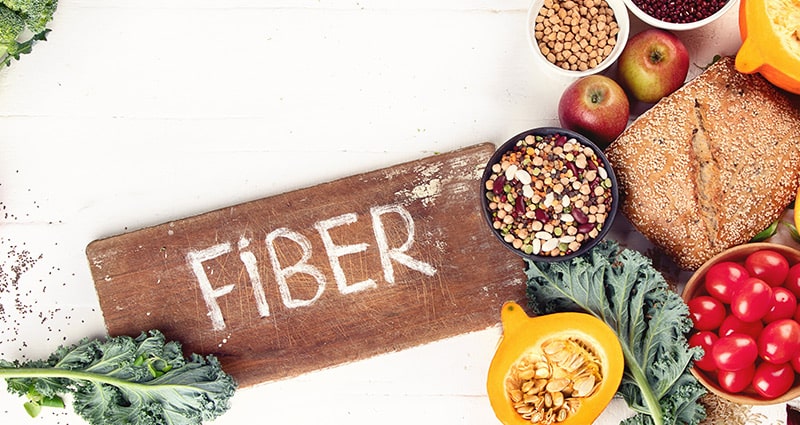Fiber plays a crucial role in maintaining good health and proper digestion. Use these practical tips to incorporate more fiber into your daily life and improve your overall well-being.
Fiber 101
Fiber is the indigestible material found in plant foods. It’s also known as “roughage.”
There are two types of fiber: soluble and insoluble.
- Soluble fiber absorbs water in the intestines like a “colonic sponge” helping to eliminate toxins from your body.
- Insoluble fiber may offer protection against colon cancer by acting as a “colonic broom” and speeding material through the intestines.
Adults need 25 to 30 grams of fiber each day. Two out of three Americans don’t get their recommended daily value of fiber. For children’s nutrition, use “age plus 5” as a guideline for their daily fiber intake. A 4-year-old child should eat at least 9 grams (4+5 = 9) of dietary fiber per day.
Why Fiber?
A high-fiber diet may help prevent cancer, heart disease and other serious health conditions.
Eating more fiber from grains and fruits can significantly lower your risk of heart problems, according to the American Medical Association. In fact, for every 10 grams of fiber you add to your daily diet, your risk of coronary issues can drop by 10% to 30%.
Fiber-rich foods tend to be more filling than other foods, helping you eat less. High-fiber foods provide an ongoing source of energy for your body throughout the day because they are digested, absorbed and processed more slowly than refined carbohydrates and sugars.
A high-fiber diet keeps blood sugar levels stable throughout the day, which may reduce your risk of developing Type 2 diabetes.
To increase fiber in your diet, avoid processed or prepared foods, which tend to be lower in fiber and are more likely to contribute to constipation.
Foods with more than 7 grams of fiber per serving include avocado, black beans, bran cereal, broccoli, green peas, kale, kidney beans, lentils, lima beans, navy beans, oats, pinto beans, split peas, raspberries, brown rice and soybeans.
What to Know About Fiber Supplements
When fiber in your diet isn’t enough, your provider may prescribe a fiber supplement.
A fiber supplement can add bulk to your stool and consolidate it so it’s easier to pass. You may need a fiber supplement even if you’re not constipated. The amount of daily fiber your doctor would recommend is not considered a laxative. The goal is to help have bowel movements that are easy to pass.
Every morning you would take one of the following:
- Coarse milled or original texture Metamucil powder – 2-3 tablespoons of orange flavored or 2-3 teaspoons of unflavored in juice – or
- Konsyl powder – 2-3 level teaspoons
Mix the fiber supplement in 8 ounces of water, juice or sugar-free flavored beverage of your choice. It’s best to use a shaker cup or a cup with a lid. Shake vigorously and then drink quickly. Then pour a small amount of water into the cup, swirl and drink to consume the rest of the fiber in your cup.
Konsyl powder is sugar-free and is the preferred fiber supplement for people with diabetes. Mix in water or a sugar-free flavored beverage.
Fiber Supplement Timing
It’s best to take fiber supplements in the morning. Taking it in the evening has the potential to cause constipation. The exception: if you have loose or watery stools, you may try taking your fiber supplement at night to help thicken your stools.
Fiber Supplements for Travelers
Metamucil and Konsyl are available in individual dose packets. You can ask a pharmacist to order a box for you or find them online. Metamucil also makes fiber wafers; two wafers are a dose with 120 calories. Fiber One bars and cereal are another option when you’re on the go.
Fiber pills or capsules, smooth texture or easy-mix powders, and fiber supplements that dissolve in liquids are not as effective as the recommended supplements.
Fiber is a Forever Deal
If your provider prescribes a fiber supplement, it’s likely to be something you continue to take long term. Regular ongoing use can help prevent hemorrhoids, constipation, anal fissures and other colon and rectal problems.




